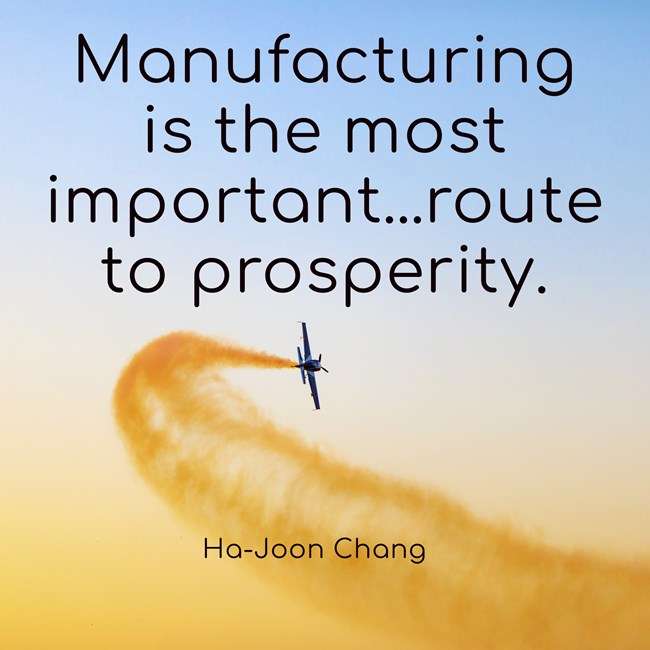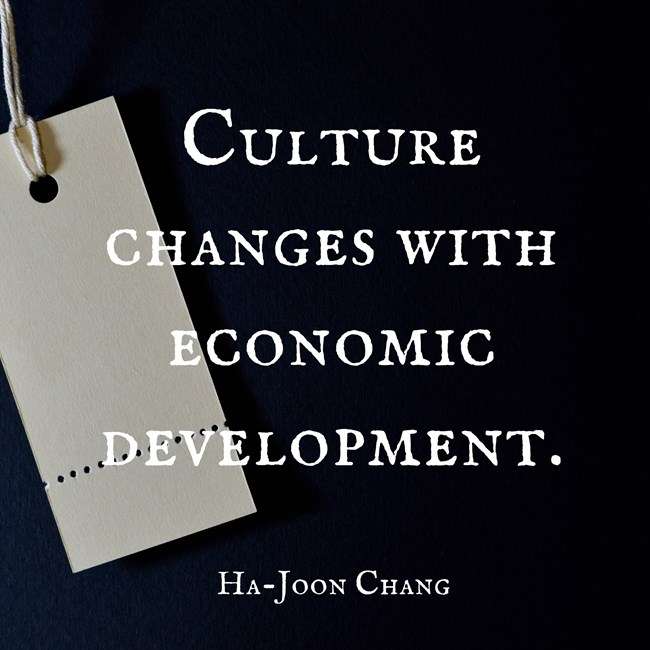Ha-Joon Chang
- Country : South Korea
- Profession :Economist
- DOB: 1963-10-07
Ha-Joon Chang, a South Korean economist born in 1963, is renowned for his critical stance on mainstream economic theories. As a Cambridge University faculty member, Chang challenges traditional economic dogmas, advocating for a more inclusive, historically grounded approach to economics. His influential works like “23 Things They Don’t Tell You About Capitalism” and “Kicking Away the Ladder” scrutinize prevailing economic ideologies. Chang emphasizes the significance of state intervention, historical context, and policy diversity in fostering economic development. His insightful critiques and alternative viewpoints have significantly contributed to reshaping contemporary economic discourse and policy considerations worldwide.
It takes time and experience to absorb new technologies, so technologically backward producers need a period of protection from international competition during this period of learning. Such protection is costly, because the country is giving up the chance to import better and cheaper products. However, it is a price that has to be paid if it wants to develop advanced industries.
Author: Ha-Joon ChangAll the alleged key causes of SOE [State-Owned Enterprise] inefficiency – the principal-agent problem, the free-rider problem and the soft budget constraint – are, while real, not unique to state-owned enterprises. Large private-sector firms with dispersed ownership also suffer from the principal-agent problem and the free-rider problem. So, in these two areas, forms of ownership do matter, but the critical divide is not between state and private ownership – it is between concentrated and dispersed ownerships.
Author: Ha-Joon ChangThere is a big logical jump between acknowledging the destructive nature of hyperinflation and arguing that the lower the rate of inflation, the better.
Author: Ha-Joon Chang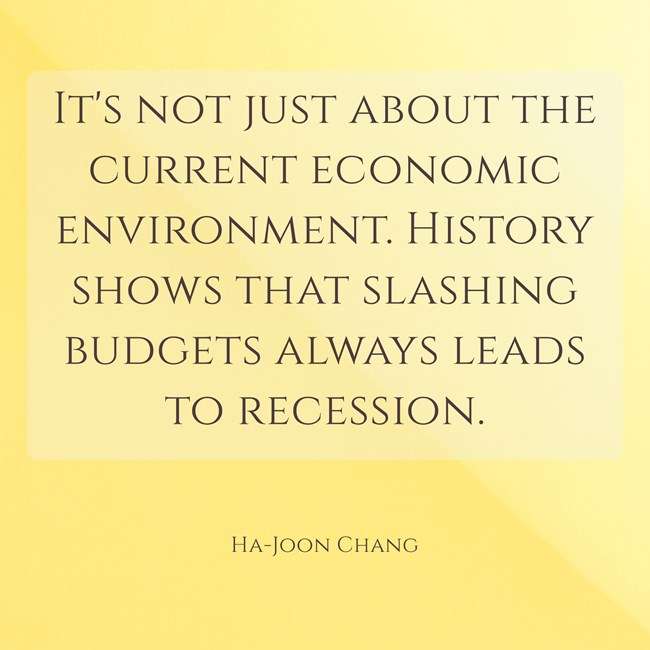
It’s not just about the current economic environment. History shows that slashing budgets always leads to recession.
Author: Ha-Joon ChangBetween the Great Depression and the 1970s, private business was viewed with suspicion even in most capitalist economies. Businesses were, so the story goes, seen as anti-social agents whose profit-seeking needed to be restrained for other, supposedly loftier, goals, such as justice, social harmony, protection of the weak and even national glory.
Author: Ha-Joon ChangAbove a certain level of income, the relative value of material consumption vis-a-vis leisure time is diminished, so earning a higher income at the cost of working longer hours may reduce the quality of your life. More importantly, the fact that the citizens of a country work longer than others in comparable countries does not necessarily mean that they like working longer hours. They may be compelled to work long hours, even if they actually want to take longer holidays.
Author: Ha-Joon Chang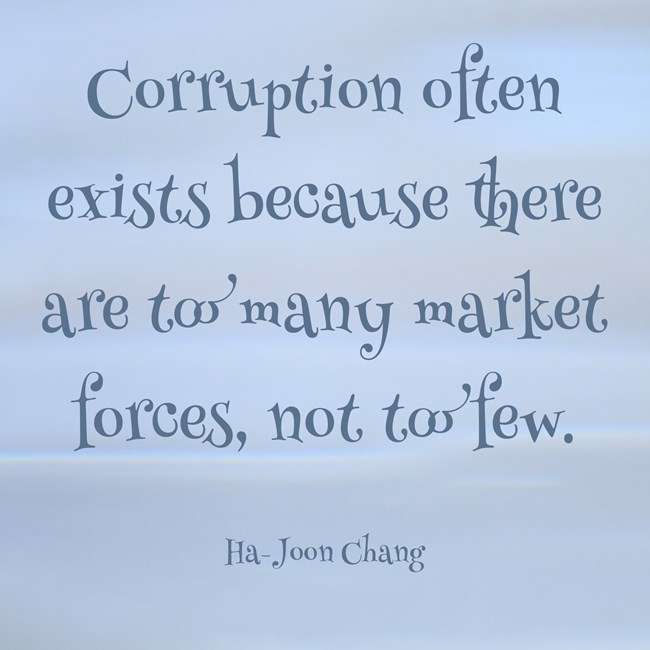
Corruption often exists because there are too many market forces, not too few.
Author: Ha-Joon ChangThe days are over when technology can be advanced in laboratories by individual scientists alone. Now you need an army of lawyers to negotiate the hazardous terrain of interlocking patents. Unless we find a solution to the problem of interlocking patents, the patent system may actually impede the very innovation it was designed to encourage.
Author: Ha-Joon ChangLow inflation and government prudence may be harmful for economic development.
Author: Ha-Joon ChangDemocracy and markets are both fundamental building blocks for a decent society. But they clash at a fundamental level. We need to balance them.
Author: Ha-Joon Chang
The widely accepted assertion that, only if you let markets be will everyone be paid correctly and thus fairly, according to his worth, is a myth. Only when we part with this myth and grasp the political nature of the market and the collective nature of individual productivity will we be able to build a more just society in which historical legacies and collective actions, and not just individual talents and efforts, are properly taken into account in deciding how to reward people.
Author: Ha-Joon ChangRecognizing that the boundaries of the market are ambiguous and cannot be determined in an objective way lets us realize that economics is not a science like physics or chemistry, but a political exercise… If the boundaries of what you are studying cannot be scientifically determined, what you are doing is not a science.
Author: Ha-Joon ChangThe inability to protect and promote their infant industries, whether due to direct colonial rule or to unequal treaties, was a huge contributing factor to the economic retrogression in Asia and Latin America during this period, when they saw negative per capita income growths (at the rates of -0.1 and -0.04 per cent per year, respectively).
Author: Ha-Joon Chang
Nothing is as effective as spectacular real-life cases – successful or otherwise – in persuading people.
Author: Ha-Joon ChangSo the two champions of free trade, Britain and the US, were not only not free trade economies, but have been the two most protectionist economies among rich countries, i.e. until they each in succession became the world’s dominant industrial power.
Author: Ha-Joon ChangUnlike what neo-liberals say, market and democracy clash at a fundamental level. Democracy runs on the principle of ‘one man (one person), one vote’. The market runs on the principle ‘one dollar, one vote’.
Author: Ha-Joon ChangIn the long run, free trade is a policy that is likely to condemn developing countries to specialize in sectors that offer low productivity growth and thus low growth in living standards.
Author: Ha-Joon ChangOur story of bus drivers reveals the existence of the proverbial elephant in the room. It shows that the living standards of the huge majority of people in rich countries critically depend on the existence of the most draconian control over their labour markets – immigration control. Despite this, immigration control is invisible to many and deliberately ignored by others, when they talk about the virtues of the free market.
Author: Ha-Joon Chang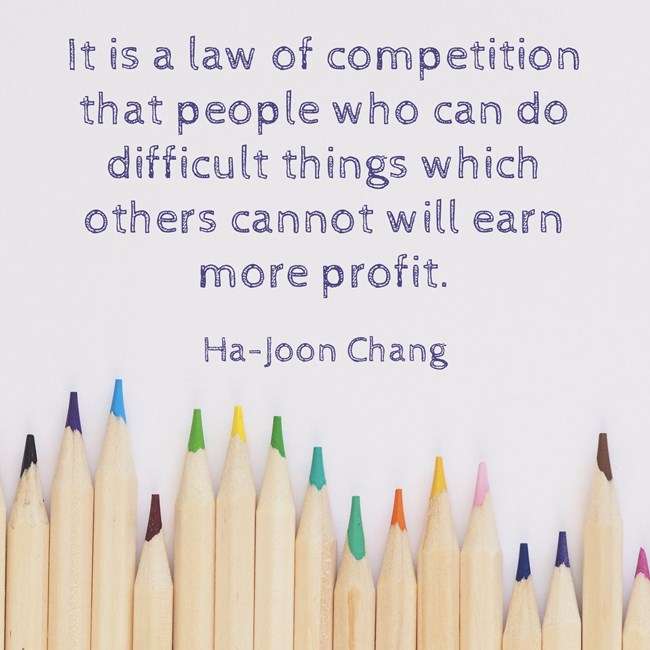
It is a law of competition that people who can do difficult things which others cannot will earn more profit.
Author: Ha-Joon ChangThe demands of a highly organized industrial society made people behave in more disciplined, calculating and cooperative ways.
Author: Ha-Joon ChangThe most important assumption underlying HOS is that all countries have equal productive capabilities – that is, they can use any technology they want.3
Author: Ha-Joon ChangThe rich countries also contribute to the brain drain from developing countries by more willingly accepting people with higher skills. These are people who could have contributed more to the development of their own countries than unskilled immigrants, had they remained in their home countries.
Author: Ha-Joon ChangGovernment exists to protect us from each other. Where government has gone beyond its limits is in deciding to protect us from ourselves.
Author: Ha-Joon Chang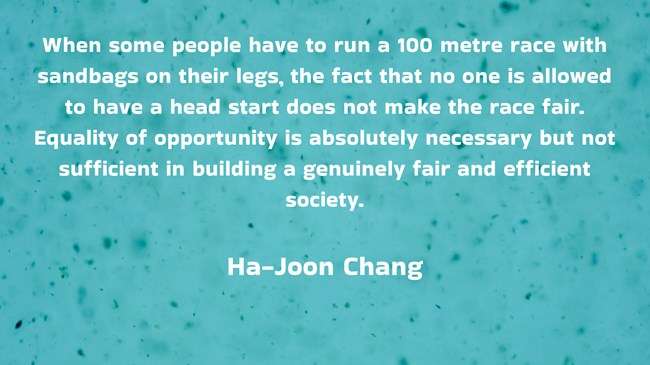
When some people have to run a 100 metre race with sandbags on their legs, the fact that no one is allowed to have a head start does not make the race fair. Equality of opportunity is absolutely necessary but not sufficient in building a genuinely fair and efficient society.
Author: Ha-Joon ChangThe issue of false consciousness is a genuinely difficult problem that has no definite solution. We should not approve of an unequal and brutal society because surveys show that people are happy. But who has the right to tell those oppressed women or starving landless peasants that they shouldn’t be happy, if they think they are? Does anyone have the right to make those people feel miserable by telling them the ‘truth’? There are no easy answers to these questions, but they definitely tell us that we cannot rely on ‘subjective’ happiness surveys to decide how well people are doing.
Author: Ha-Joon ChangBreaking away from the illusion of market objectivity is the first step towards understanding capitalism.
Author: Ha-Joon Changall technical professions have an incentive to make themselves look more complicated than they really are so that they can justify the high fees their members charge for their services.
Author: Ha-Joon ChangSometimes it is in the long-run interest of the business sector to restrict the freedom of individual firms so that they do not destroy the common pool of resources that all of them need, such as natural resources or the labour force.
Author: Ha-Joon Chang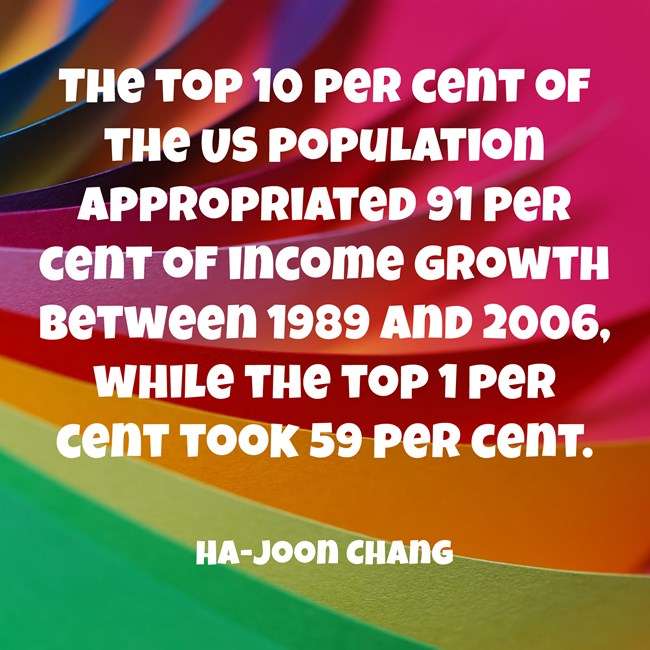
The top 10 per cent of the US population appropriated 91 per cent of income growth between 1989 and 2006, while the top 1 per cent took 59 per cent.
Author: Ha-Joon ChangEconomics is a political argument. It is not – and can never be – a science; there are no objective truths in economics that can be established independently of political, and frequently moral, judgements. Therefore, when faced with an economic argument, you must ask the age-old question ‘Cui bono?’ (Who benefits?), first made famous by the Roman statesman and orator Marcus Tullius Cicero.
Author: Ha-Joon ChangThe widely accepted assertion that, only if you let markets be will everyone be paid correctly and thus fairly, according to his worth, is a myth. Only when we part with this myth and grasp the political nature of the market and the collective nature of individual productivity will we be able to build a more just society in which historical legacies and collective actions, and not just individual talents and efforts, are properly taken into account in deciding how to reward people.
Author: Ha-Joon ChangIf the world were full of the self-seeking individuals found in economics textbooks, it would grind to a halt because we would be spending most of our time cheating, trying to catch the cheaters, and punishing the caught. The world works as it does only because people are not the totally self seeking agents that free-market economics believes them to be. We need to design an economic system that, while acknowledging that people are often selfish, exploits other human motives to the full and gets the best out of people. The likelihood is that, if we assume the worst about people, we will get the worst out of them.
Author: Ha-Joon ChangWhen I give food to the poor, they call me a saint. When I ask why the poor have no food, they call me a communist.
Author: Ha-Joon Chang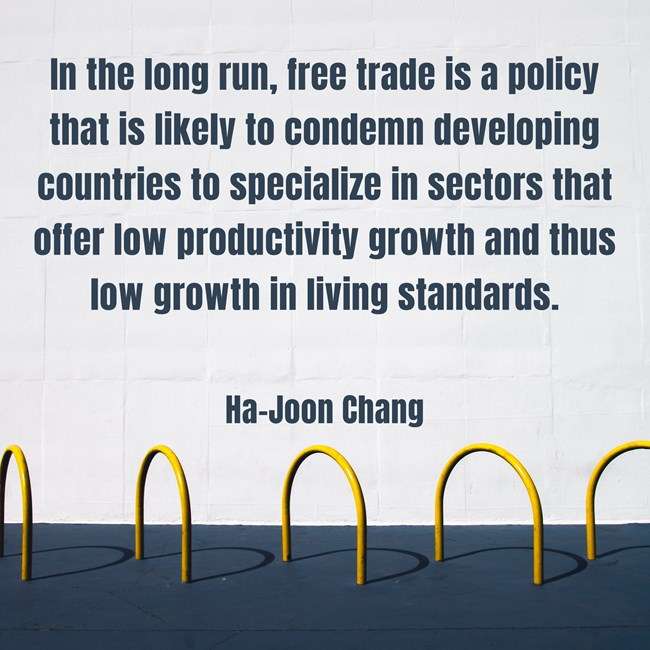
In the long run, free trade is a policy that is likely to condemn developing countries to specialize in sectors that offer low productivity growth and thus low growth in living standards.
Author: Ha-Joon ChangBreaking away from the illusion of market objectivity is the first step towards understanding capitalism.
Author: Ha-Joon ChangWhy do we need to make the rich richer to make them work harder but make the poor poorer for the same purpose?
Author: Ha-Joon ChangMarkets weed out inefficient practices, but only when no one has sufficient power to manipulate them.
Author: Ha-Joon ChangRunning the company for the shareholders often reduces its long-term growth potential.
Author: Ha-Joon Chang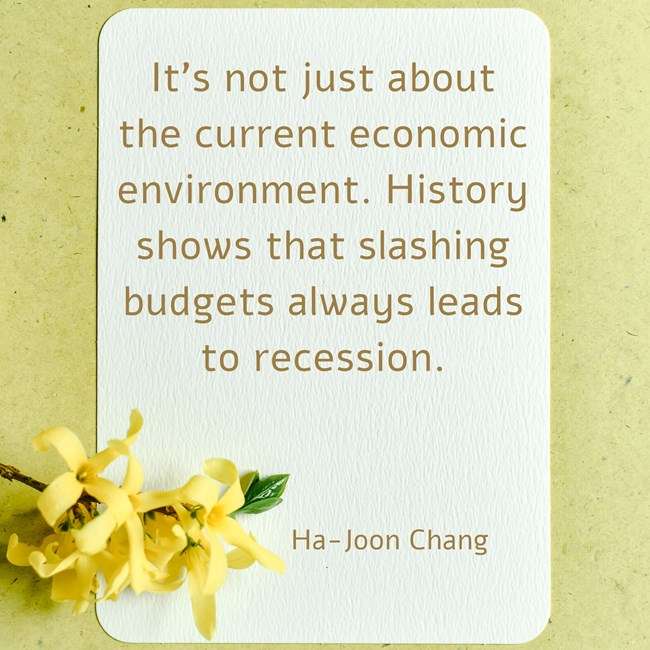
It’s not just about the current economic environment. History shows that slashing budgets always leads to recession.
Author: Ha-Joon ChangVery often, the judgments by ordinary citizens may be better than those by professional economists, being more rooted in reality and less narrowly focused.
Author: Ha-Joon ChangAs a consumer, I don’t create art, but I think whatever the message is, art has to touch you.
Author: Ha-Joon ChangAs someone from a developing country, I have a problem with rich countries thinking they can tell us anything, simply because they are giving money.
Author: Ha-Joon Chang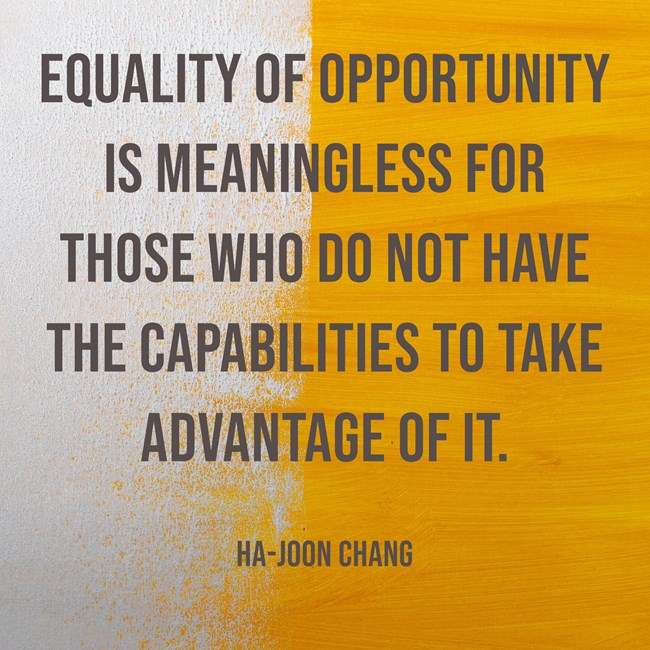
Equality of opportunity is meaningless for those who do not have the capabilities to take advantage of it.
Author: Ha-Joon ChangBetween the Great Depression and the 1970s, private business was viewed with suspicion even in most capitalist economies. Businesses were, so the story goes, seen as anti-social agents whose profit-seeking needed to be restrained for other, supposedly loftier, goals, such as justice, social harmony, protection of the weak and even national glory.
Author: Ha-Joon ChangA well-designed welfare state can actually encourage people to take chances with their jobs and be more, not less, open to changes.
Author: Ha-Joon ChangThe higher education system in these countries (US, Korea etc) has become like a theatre in which some people decided to stand to get a better view, promoting the others behind them to stand. Once enough people stand, everyone has to stand, which means no one is getting a better view, while everyone has become more uncomfortable.
Author: Ha-Joon ChangSince the 1980s, we have given the rich a bigger slice of our pie in the belief that they would create more wealth, making the pie bigger than otherwise possible in the long run. The rich got the bigger slice of the pie all right, but they have actually reduced the pace at which the pie is growing.
Author: Ha-Joon Chang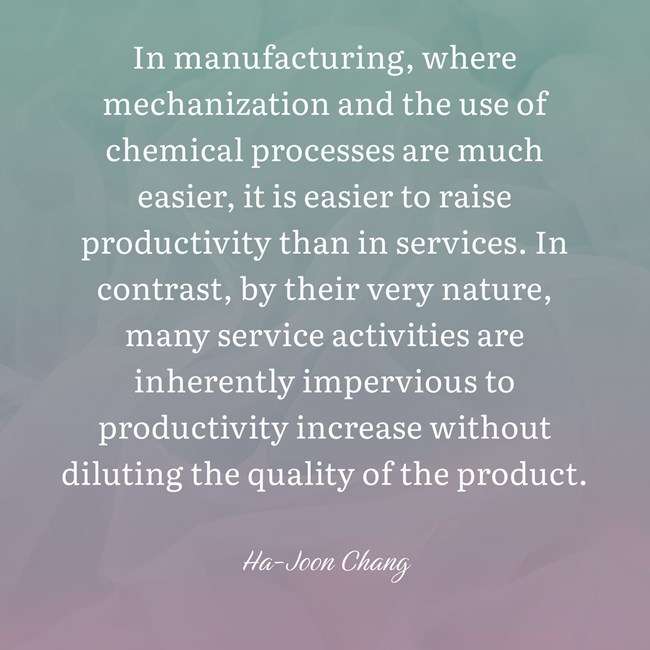
In manufacturing, where mechanization and the use of chemical processes are much easier, it is easier to raise productivity than in services. In contrast, by their very nature, many service activities are inherently impervious to productivity increase without diluting the quality of the product.
Author: Ha-Joon Chang[Good managers] know that people have ‘good’ sides and ‘bad’ sides and that the secret of good management is in magnifying the former and toning down the latter.
Author: Ha-Joon ChangDemocracy is acceptable to neo-liberals only in so far as it does not contradict the free market.
Author: Ha-Joon Chang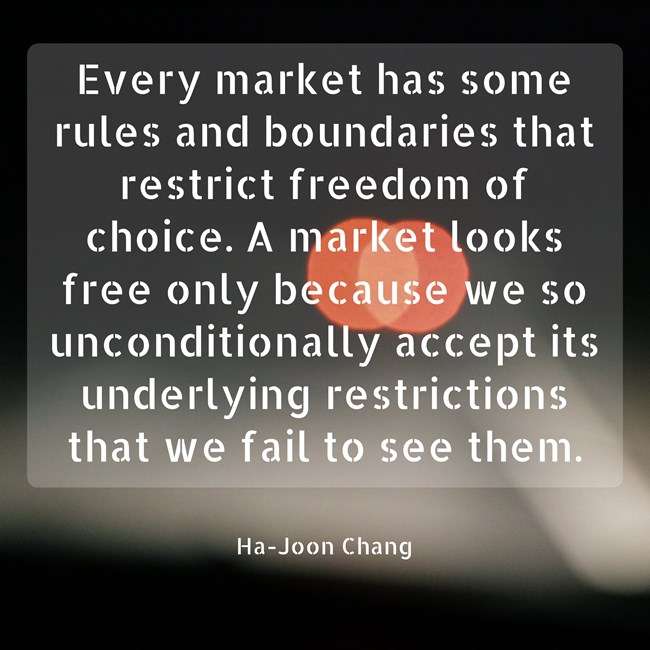
Every market has some rules and boundaries that restrict freedom of choice. A market looks free only because we so unconditionally accept its underlying restrictions that we fail to see them.
Author: Ha-Joon ChangI’ve read quite a few readers’ reviews of my book on Amazon, saying, ‘Ah, he criticises the free market, he advocates central planning.’ I don’t do that for a minute! But this is our black and white, dichotomous way of thinking – which has really been harmful.
Author: Ha-Joon ChangPatent monopoly creates a lot of problems. It allows the patentee to charge the maximum to consumers. This may not be a problem if the patented product is a luxury item, like parts that go into a smartphone, but can violate basic human rights if it involves things such as life-saving drugs.
Author: Ha-Joon ChangBy liberating women from household work and helping to abolish professions such as domestic service, the washing machine and other household goods completely revolutionised the structure of society.
Author: Ha-Joon Chang
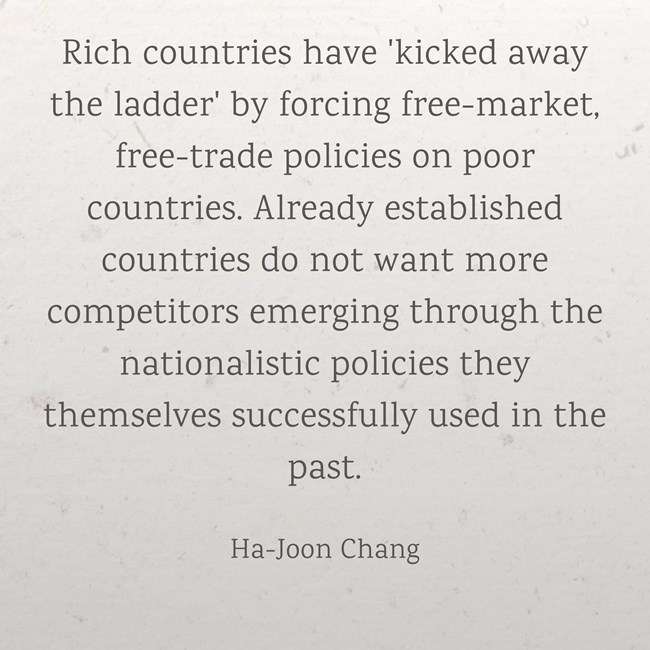
Rich countries have ‘kicked away the ladder’ by forcing free-market, free-trade policies on poor countries. Already established countries do not want more competitors emerging through the nationalistic policies they themselves successfully used in the past.
Author: Ha-Joon ChangThe history of capitalism has been so totally re-written that many people in the rich world do not perceive the historical double standards involved in recommending free trade and free market to developing countries.
Author: Ha-Joon ChangThere are different ways to organise capitalism.
Free-market capitalism is only one of them-and not a very good one at that.
95 percent of economics is common sense made complicated, and even for the remaining 5 percent, the essential reasoning, if not all the technical details, can be explained in plain terms.
Author: Ha-Joon ChangRational thinking is an important aspect of human nature, but we have imagination, we have ambition, we have irrational fear, we are swayed by other people, we get indoctrinated and we get influenced by advertising.
Author: Ha-Joon ChangThe foundation of economic development is the acquisition of more productive knowledge.
Author: Ha-Joon ChangSelf-interest, to be sure, is one of the most important, but we have many other motives – honesty, self-respect, altruism, love, sympathy, faith, sense of duty, solidarity, loyalty, public-spiritedness, patriotism, and so on – that are sometimes even more important than self-seeking as the driver of our behaviors.
Author: Ha-Joon ChangOnce you realize that trickle-down economics does not work, you will see the excessive tax cuts for the rick as what they are — a simple upward redistribution of income, rather than a way to make all of us richer, as we were told.
Author: Ha-Joon Chang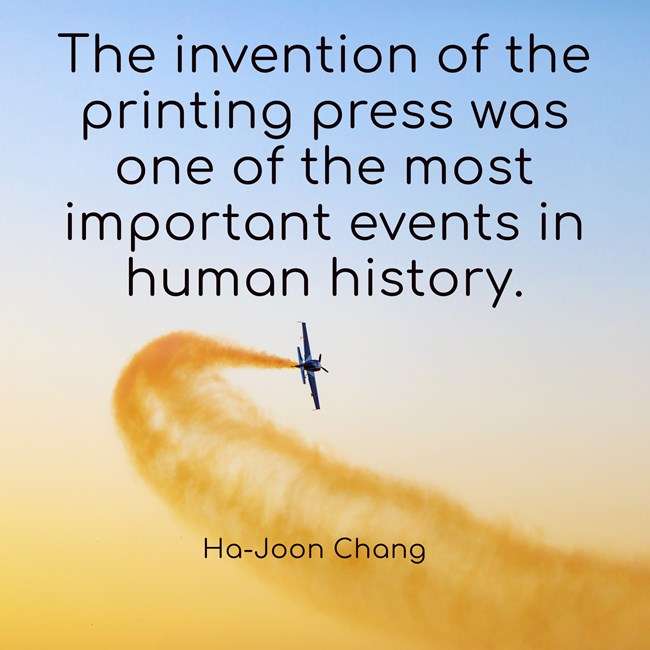
The invention of the printing press was one of the most important events in human history.
Author: Ha-Joon ChangTo paraphrase Winston Churchill, capitalism is the worst economic system except for all the other forms.
Author: Ha-Joon Chang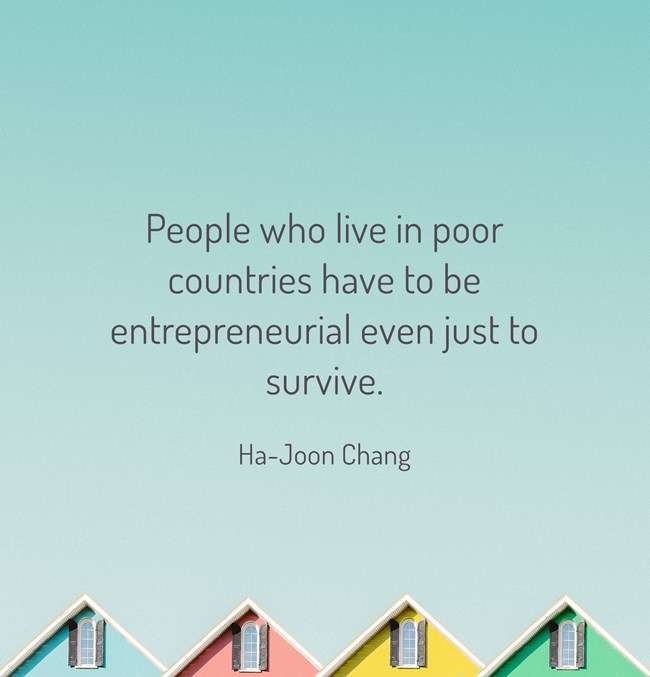
People who live in poor countries have to be entrepreneurial even just to survive.
Author: Ha-Joon ChangPeople ‘over-produce’ pollution because they are not paying for the costs of dealing with it.
Author: Ha-Joon ChangEquality of opportunity is not enough. Unless we create an environment where everyone is guaranteed some minimum capabilities through some guarantee of minimum income, education, and healthcare, we cannot say that we have fair competition. When some people have to run a 100 metre race with sandbags on their legs, the fact that no one is allowed to have a head start does not make the race fair. Equality of opportunity is absolutely necessary but not sufficient in building a genuinely fair and efficient society.
Author: Ha-Joon Chang